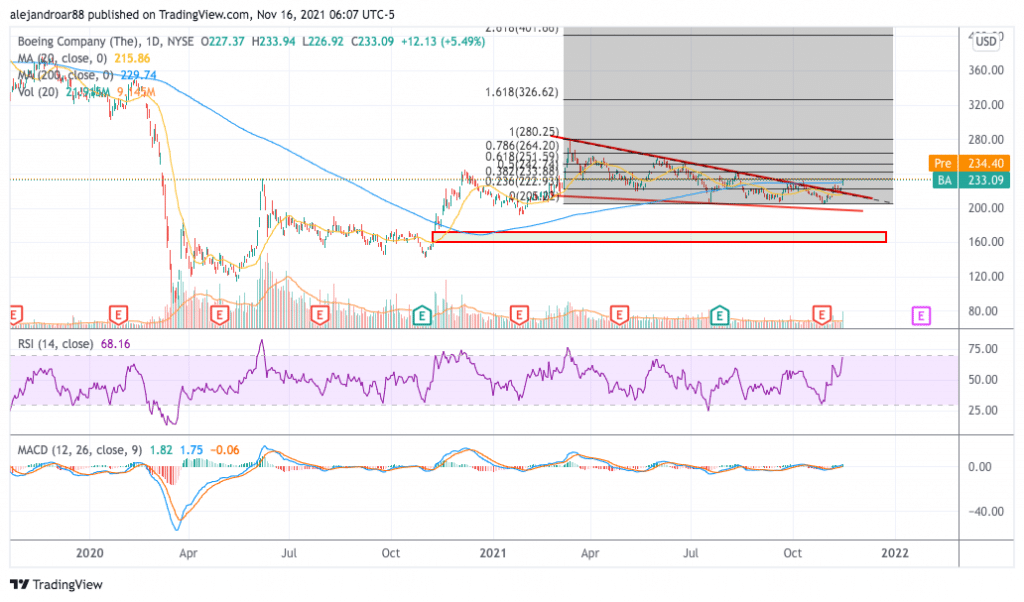Boeing Stock Up 13% in November – Time to Buy BA Stock?
Please note that we are not authorised to provide any investment advice. The content on this page is for information purposes only.
The price of Boeing stock has surged nearly 13% so far in November as a result of multiple positive news coming out of the Dubai Air Show – a top industry event that started on 14th November and that is expected to end on the 18th.
Boeing’s 777X model was one of the main attractions of the event. The aircraft is being deemed by the company as “the world’s largest and most efficient twin-engine jet” and Boeing (BA) expects to deliver the first units by 2023.
Thus far, the company has announced multiple deals signed during the event including the following:
- DHL ordered nine 767-300BCF freighters.
- Emirates SkyCargo ordered two 777 Freighters valued at around $704 million.
- Air Tanzania ordered a 787-8 Dreamliner, a 767-300 Freighter, and two 737 MAX jets with an estimated value of $726 million.
Aside from the money value of the deals, these agreements show that airlines are resuming, at least to some extent, their investments in the sector at a point when the world is progressively stepping out of the pandemic. Moreover, the deal with Emirates shows that the 777X is getting positive feedback from top airline executives.
Market participants have reacted positively to the news as shares of the aircraft manufacturer jumped 5.5% yesterday following this wave of positive news.
Can yesterday’s uptick mark the beginning of an uptrend for Boeing stock? In this article, I’ll be taking a look at the price action and fundamentals of the company to possibly answer that question.
67% of all retail investor accounts lose money when trading CFDs with this provider.
Boeing Stock – Technical Analysis

The price of Boeing stock had been on a steady downtrend since its March post-pandemic high of $279 per share as concerns about the prolonged impact of the Delta variant on the recovery of the commercial aviation sector weighed on Boeing’s performance.
Yesterday’s uptick is potentially reversing this downtrend as the price moved decisively above its short-term moving averages during a session that saw 22 million shares exchanging hands. This figure exceeded the 10-day average volume by more than 2 times.
Momentum oscillators ticked higher as well with the Relative Strength Index (RSI) now entering overbought territory for the first time since the March rally while the MACD has steadily climbed to positive territory accompanied by increasingly higher histogram readings.
The 200-day moving average remains the most important resistance to overcome for Boeing stock. Yesterday’s jump pushed the price above this threshold but the next few days will determine if bulls are in full control of the situation.
In this regard, if the price declines below this mark (which stands at around $230 at the moment) in the next few days, chances are that this will a short-lived rally. However, if the price jumps above the $242.5 level, the odds will favor a bullish outlook as the trend reversal will be confirmed.
A mid-term target for Boeing could be set at $326 per share if that happens with these latest news serving as the positive catalyst that could push the stock to those levels.
Boeing Stock – Fundamental Analysis
Even though the financial impact of the orders announced by Boeing is not that relevant in the context of how much they represent compared to the firm’s annual top-line results, they are a sign that industry executives are readying their pockets to invest in new equipment for their businesses.
Moreover, the 777X model seems to have been welcomed by companies within the sector as indicated by interest and orders from top carriers.
For Boeing, leaving behind the disaster that was the 737 Max model is important for its future as the company needs to regain the confidence of airlines, regulators, and passengers.
Analysts’ estimates are anticipating that Boeing should soon see its sales jumping back to pre-pandemic levels, with top-line results being expected to land at around $88 billion next year – up 14% from the $76.6 billion the firm brought back in 2019.
Moreover, adjusted earnings per share are expected to land at $5.13 next year as well while a 63% jump in the firm’s bottom-line profitability is expected to take place the year after.
At its current price of $233 per share, Boeing is being valued at 45 times its forecasted 2022 adjusted EPS.
Moving forward, the firm must deal with its massive long-term debt of around $55.6 billion. Market participants are probably expecting that some of those commitments will be paid off by using a portion of the firm’s $20 billion cash reserves to alleviate the impact of interest expenses on Boeing’s bottom-line profitability. Last year, the firm spent $2.1 billion in interest and this figure has climbed to $2.5 billion in the past 12 months.
Next year’s outlook seems particularly optimistic and the firm’s ability to live up to these forecasts will possibly determine how high the stock can go. Any issues that lead to below-expected profitability for Boeing could possibly result in further pain for the stock price down the line considering the optimistic scenario that the market is assuming for the business.






